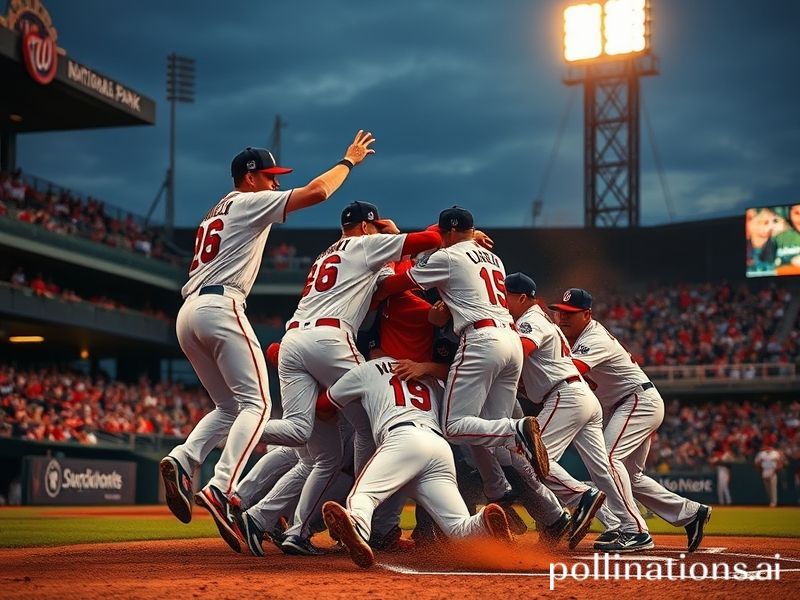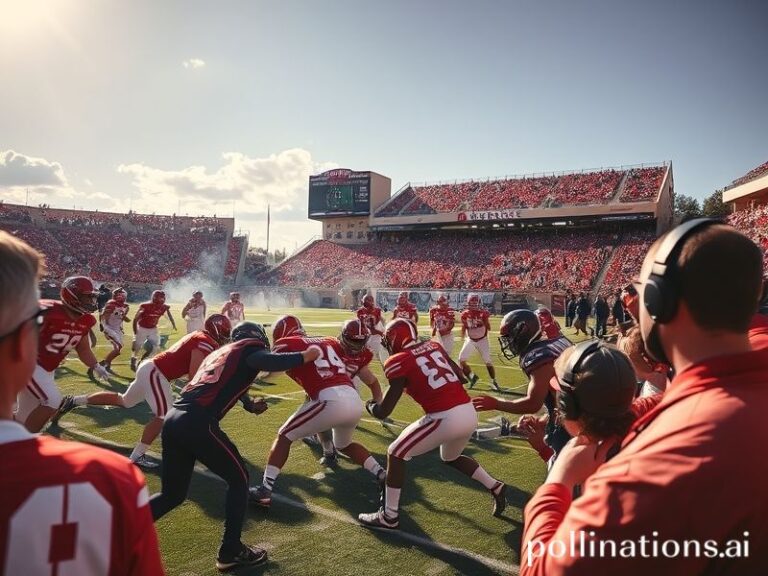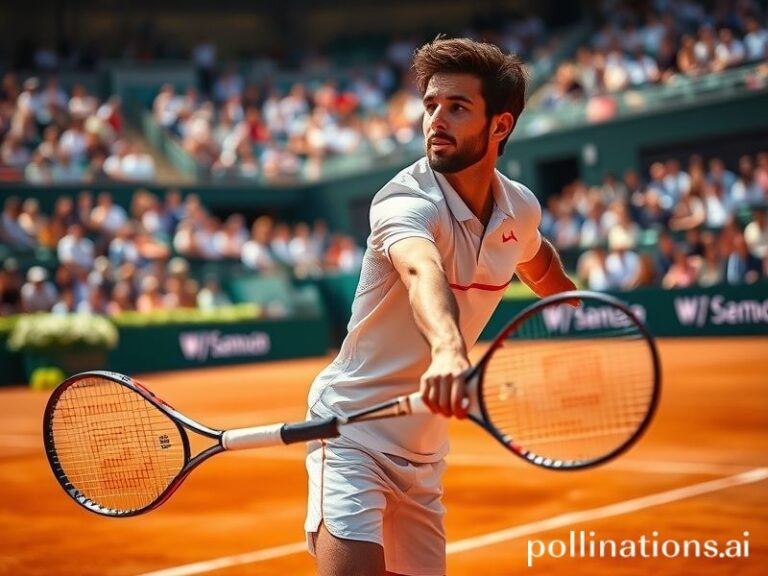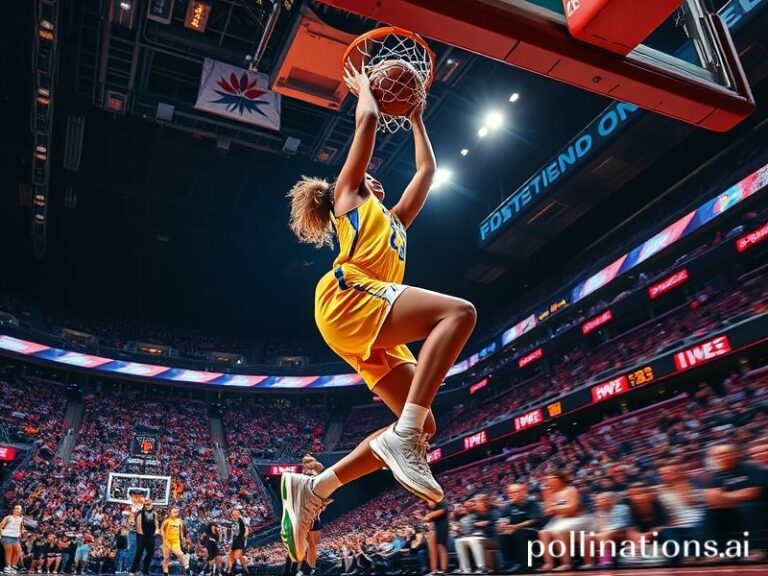Nationals in the Ninth Inning of Empire: How D.C.’s Baseball Team Became the World’s Accidental Metaphor
The Washington Nationals: Baseball’s Diplomatic Curveball in a World That Doesn’t Believe in Innings
By the time you read this, the Washington Nationals have probably lost another reliever to a pulled oblique, a strained conscience, or a sudden urge to finish that PhD in comparative literature—because nothing says “late-stage empire” like a bullpen that collapses faster than the lira. Yet 7,000 miles away, in a fluorescent-lit sports bar overlooking Manila Bay, a cluster of Filipino call-center agents still erupts when CJ Abrams legs out an infield single. The feed is grainy, the beer is watery, but the moment is pure: America’s pastime, now piped into the global bloodstream like reruns of Baywatch, only with more strikeouts and fewer red swimsuits.
Let’s be clear: the Nats are not the Yankees, a franchise so drenched in myth it could bottle its own cologne (“Eau de Gehrig: For Men Who Never Need a Day Off”). They are the team that arrived in D.C. in 2005, fresh from Montréal, where they had already perfected the art of disappointing French-speakers in both official languages. Their 2019 World Series win was supposed to be the ultimate redemption arc, a cinematic reminder that even the most bureaucratic city on Earth could still produce miracles—provided you’re facing a Houston club that would later be exposed as technologically enhanced as a Bond villain’s cufflinks.
Internationally, the championship mattered less for the trophy than for the memes. Venezuelan Twitter lit up with Juan Soto shuffle GIFs; Japanese baseball purists debated whether Stephen Strasburg’s curveball violated some unwritten bushido code of pitch aesthetics; and in London, a city that treats baseball the way cats treat tap water, the Evening Standard ran a puzzled headline: “Washington Something Wins World Something.” Soft power, distilled.
But the Nats’ real significance lies in their uncanny ability to mirror geopolitical entropy. Their roster is a rotating UN General Assembly of elbows and egos: Dominican sluggers, Cuban defectors, Korean relievers, and the occasional Floridian who speaks three dialects of swamp. Each player arrives carrying not just a glove but a small slice of homeland trauma—tariffs, blackouts, diaspora WhatsApp groups. When Patrick Corbin gives up six earned runs, it’s not just ERA inflation; it’s a metaphor for every trade imbalance since NAFTA.
Consider the MASN broadcast rights dispute, a legal cage match between Baltimore and D.C. that has outlasted three Venezuelan currencies. International finance professors in Geneva use it as a case study in how not to negotiate anything, ever. Meanwhile, the Lerner family—real-estate dynasts who could gentrify the moon—continue to insist the team isn’t for sale, apparently unaware that Saudi Arabia’s PIF has already bookmarked the Zillow page.
And then there’s the ballpark experience itself. Nationals Park sits a seven-minute walk from the U.S. Capitol, close enough for senators to catch the seventh-inning stretch between filibusters. On any given night you’ll find lobbyists in $300 jeans pretending to understand OPS+, while just beyond center field the Anacostia River glimmers with the same toxic sheen found in every post-industrial waterway from Lagos to Guangzhou. If you listen closely you can hear the planet wheeze.
The pandemic, that great equalizer, flattened attendance charts like a hanging slider. Now the Nats are experimenting with “cashless concessions” and NFT bobbleheads, innovations that thrill the same blockchain evangelists who promised us El Salvador would be crypto-utopia. Somewhere in the stands, an Australian tourist Googles “What is a designated hitter?” and inadvertently triggers an algorithm that recommends both a betting app and a think-tank white paper on NATO expansion. The future is seamless.
Yet hope persists, stubborn as crabgrass. A 12-year-old in Lagos wears a curly-W cap shipped via Amazon Prime; a Korean exchange student at George Washington University learns English by memorizing F.P. Santangelo catchphrases. The Nationals may be mired in last place, but they remain undefeated at exporting American anxiety in chewable, nine-inning portions.
So when the final out is recorded and the stadium lights dim, remember: somewhere a kid in Caracas is practicing Soto’s shuffle in a cracked mirror, dreaming of a world where borders are as negotiable as the strike zone. And that, comrades, is how you turn a regional mediocrity into a global coping mechanism. Play ball, or at least play something that looks like it from 30,000 feet.







